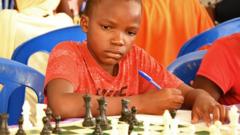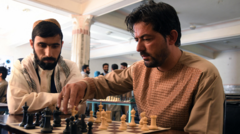Robert Katende's SomChess Academy in Katwe is enabling countless children to pursue chess, fostering resilience and strategizing skills. While facing financial challenges and repercussions from the “Queen of Katwe” film's unexpected losses, Katende remains hopeful in his mission to inspire future generations.
Inspiring Minds: The Ongoing Legacy of Uganda's Chess Champions

Inspiring Minds: The Ongoing Legacy of Uganda's Chess Champions
The transformative journey of Uganda's chess initiative continues to empower young talent in the slums of Kampala, despite financial hardships.
Robert Katende's chess initiative in Uganda, made famous by the film "Queen of Katwe," is still thriving in the shadows of financial constraints. For over two decades, Katende has dedicated himself to coaching children, using chess as a vehicle for personal growth and development.
Katende's journey began with a single chessboard in 2004 after he transitioned from coaching football in Katwe, a struggling neighborhood of Kampala. This grassroots movement has produced champion players, the most notable being Phiona Mutesi, who rose above her circumstances to become a renowned chess player featured in the film starring Lupita Nyong'o. Her journey, marked by determination, exemplifies the profound impact chess can have on young lives, inspiring many like 18-year-old Patricia Kawuma.
Kawuma, a two-time national junior champion, has not only secured educational scholarships through her chess skills but has also learned valuable life lessons in strategy, planning, and discipline. Katende proudly states that his programs have benefited over 4,000 children over the years, some of whom have advanced to successful careers in various fields.
Katende's momentous boost came from a Disney-produced film based on Mutesi's life story, which, despite its underwhelming financial performance, raised awareness of his initiatives. Initially promised a substantial share of profits from the film, Katende later learned that the project had incurred losses, leaving his organization in a precarious position. "People think I am a wealthy Hollywood chess coach, but we are yet to see any benefits from the film," he lamented.
Despite these setbacks, an unwavering optimism shines through Katende. He acknowledges the film’s role in garnering international support for his academy and chess endeavors. Currently, Katende serves over 2,500 children and extends his programs to inmates in Ugandan prisons and neighboring countries.
However, the COVID-19 pandemic has strained resources, resulting in a reduction of staff and operational centers. Exceptional young talents like 19-year-old Jovan Kasozi faced missed opportunities due to insufficient funding for competition costs. Yet, he remains determined, stating, “Chess stimulates my mind and helps me excel at mathematics. It makes me think like a computer.”
With aspirations to revive his chess programs, Katende clings to hope that financial assistance will return as Disney rebounds from its losses. His belief that chess is a metaphor for life illuminates his commitment to nurturing the next generation of thinkers.



















